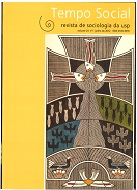The object of social sciences and the communicative turn: Adorno after Habermas
DOI:
https://doi.org/10.1590/S0103-20702012000100014Keywords:
Habermas, Adorno, Critical Theory, Rationality, LanguageAbstract
The article intends to reconsider the critique of Theodor Adorno's Social Theory formulated by Jürgen Habermas. In the first part of the text we analyze in detail the reasons Habermas enounces to leave behind the dialectical criticism of the process of social rationalization. In order to put forward our objections to Habermas' interpretation we reconstruct, in the second part, two essential thesis, which became displaced by the paradigm of communicative action, and which had served Adorno to elaborate his criticism of the prevailing modernization process. As a conclusion, we propose a different understanding of the roll played by communication in the constitution of contemporary societies, through an analysis - based upon Adorno - of the relationship between language and rationality.Downloads
References
Adorno, Theodor. (1964), Minima Moralia. Frankfurt, Suhrkamp.
. (1997a), Negative Dialektik. Frankfurt, Suhrkamp.
. (1997b), “Kulturkritik und Gesellschaft”. In: . Gesammelte Schriften. Frankfurt, Suhrkamp, vol. 10.2, pp. 455-844.
. (1997c), “Soziologische Schriften”. In: . Gesammelte Schriften. Frankfurt, Suhrkamp, vol. viii, pp. 4-408.
. (1997d), “Ästhetische Theorie”. In: . Gesammelte Schriften. Frankfurt, Suhrkamp, vol. vii, pp. 7-545.
. (1997e), “Zur Metakritik der Erkenntnistheorie”. In: . Gesammelte Schriften. Frankfurt, Suhrkamp, vol. v, pp. 9-247.
. (1997f), “La actualidad de la Filosofía”. In: . Actualidad de la filosofía. Barcelona, Altaya, pp. 73-102.
Adorno, Theodor & Horkheimer, Max. (1997), “Dialektik der Aufklärung” In: Adorno, Theodor. Gesammelte Schriften. Frankfurt, Suhrkamp, vol. iii, pp. 9-336.
Adorno, Theodor et al. (1972), La disputa del positivismo en la sociología alemana. Barcelona/México, Grijalbo.
Aguilera, Antonio. (1997), “Introducción: Lógica de la descomposición”. In: Adorno, Theodor. Actualidad de la filosofía. Barcelona, Altaya, pp. 9-70.
Benjamin, Walter. (1999), “Sobre el lenguaje en general y sobre el lenguaje de los humanos”. In : . Iluminaciones. Madrid, Taurus, vol iv, pp. 59-74.
Habermas, Jürgen. (1987a), Teoría de la acción comunicativa. Madrid, Taurus, vol. 1.
. (1987b), Teoría de la acción comunicativa. Madrid, Taurus, vol. 2.
Herder, Johann Gottfried. (1959), Ideas para una filosofía de la historia de la humanidad. Buenos Aires, Losada.
. (1986), “Entendimento e experiência: uma metacrítica à Crítica da razão pura”, In: Justo, José M. (org.) Ergon ou energeia: filosofia da linguagem na Alemanha – Séculos xviii e xix. Lisboa, Apaginastas, pp. 59-100.
Honneth, Axel. (1991), The critic of power: reflective stages in a critical social theory. Massachusetts, mit Press.
. (1995), The fragmented world of the social. New York, State University of New York.
Horkheimer, Max. (1967), Zur Kritik der instrumentellen Vernunft. Frankfurt, Suhrkamp.
Morris, Martin. (2001), Rethinking the communicative turn: Adorno, Habermas and the problem of communicative freedom. New York, State University of New York.
Pollock, Friedrich. (1989), “State capitalism: its possibilities and limitations”. In: Bronner, Stephen e Kellner, Douglas (orgs.) Critical theory and society. New York, Routledge, pp. 95-118.
Downloads
Published
Issue
Section
License
Copyright (c) 2015 Tempo Social

This work is licensed under a Creative Commons Attribution-NonCommercial 4.0 International License.


